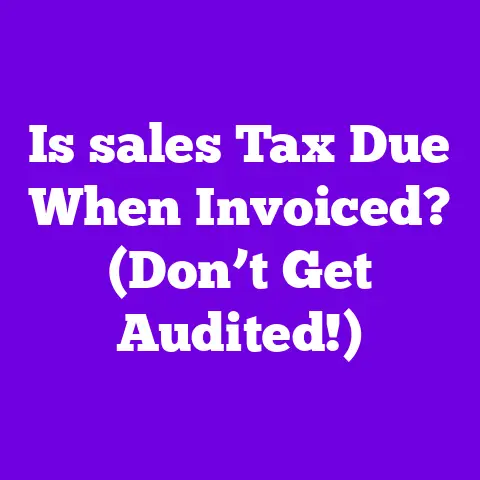How Car sales Tax Works (Don’t Overpay!)
Imagine this: You walk into a gleaming car dealership, the air thick with the scent of new leather and possibility.
Rows of meticulously polished vehicles stretch before you, each promising adventure and freedom.
You’ve done your research, saved diligently, and today is the day you drive off in your dream car.
But amidst the excitement, there’s a crucial financial aspect lurking: car sales tax.
Understanding it is the key to a truly satisfying purchase, ensuring you don’t overpay and drive away with buyer’s remorse.
Car sales tax can be a confusing maze of rates, regulations, and exemptions.
Many buyers, caught up in the thrill of the purchase, overlook crucial details and end up paying more than they should.
My aim is to demystify this process for you, providing the knowledge you need to navigate the car-buying landscape in 2025 with confidence and save money in the process.
Consider me your guide to understanding car sales tax, so you can buy a car without the financial stress.
Understanding Car Sales Tax
Car sales tax is a percentage of the vehicle’s purchase price that you, as the buyer, must pay to the state and, in some cases, local governments.
Think of it as a consumption tax, levied on the sale of goods and services.
This tax revenue funds various public services, such as road maintenance, education, and public safety.
The calculation is straightforward:
Sales Tax Amount = Vehicle Price x Sales Tax Rate
However, the “devil is in the details.” The “vehicle price” can be affected by trade-ins, rebates, and other factors, and the “sales tax rate” varies widely.
The core of car sales tax is calculated by multiplying the car’s purchase price by the applicable tax rate.
Here’s the formula:
Sales Tax = (Purchase Price of Car) x (Sales Tax Rate)
For example, if you buy a car for $30,000 and the sales tax rate is 6%, the calculation would be:
Sales Tax = ($30,000) x (0.06) = $1,800
Therefore, the sales tax on your car would be $1,800.
The sales tax is a percentage of the vehicle’s purchase price, and the tax revenue funds local and state public services.
State vs. Local Sales Tax: A Significant Difference
It’s crucial to understand that sales tax isn’t always a flat rate across an entire state.
Many states allow cities, counties, and other local jurisdictions to impose their own sales taxes in addition to the state rate.
This can lead to significant variations, even within the same state.
For example, in California, the state sales tax rate is 7.25%.
However, with local taxes added, the total rate can climb as high as 10.75% in some areas (Source: California Department of Tax and Fee Administration).
That’s a substantial difference that can add hundreds or even thousands of dollars to your final bill.
New vs. Used Cars: The Taxman Doesn’t Discriminate
Generally, sales tax applies to both new and used cars.
The key factor is the sale itself.
Whether the car is fresh off the assembly line or has had several previous owners, the transaction is subject to sales tax.
There are a few exceptions to this rule, though they are rare.
For example, some states offer exemptions for certain types of vehicles, such as those used for agricultural purposes or those purchased by government agencies.
Sales Tax Rates by State
Sales tax rates vary dramatically from state to state.
Some states have no sales tax at all, while others have rates exceeding 7%.
Here’s a snapshot of average car sales tax rates for 2025 (note: these are averages and can be higher in specific localities):
Disclaimer: Sales tax rates are subject to change.
Always verify the current rates with your state’s Department of Revenue.
California, a leader in promoting electric vehicle adoption, offers the Clean Vehicle Rebate Project (CVRP), which provides rebates to eligible residents who purchase or lease new electric vehicles (Source: Clean Vehicle Rebate Project).
While this isn’t a sales tax exemption, it effectively lowers the overall cost of the vehicle.
Georgia, has a Title Ad Valorem Tax (TAVT).
TAVT is a one-time tax paid at the time of titling the vehicle, rather than an annual property tax.
Residency and Out-of-State Purchases
Residency plays a crucial role in determining your sales tax obligations.
Generally, you pay sales tax in the state where you register the vehicle, which is typically your state of residence.
If you purchase a car out of state, you might not pay sales tax at the dealership.
However, you’ll still be required to pay sales tax when you register the vehicle in your home state.
It’s essential to factor this into your budget when considering out-of-state purchases.
Exemptions and Deductions
While sales tax is generally unavoidable, certain exemptions and deductions can reduce your tax burden.
Common Exemptions
- Farm Vehicles: Many states offer exemptions for vehicles used primarily for agricultural purposes.
- Government Purchases: Vehicles purchased by government agencies are typically exempt from sales tax.
- Vehicles for Export: If you purchase a vehicle with the intention of exporting it outside the United States, you may be eligible for an exemption.
Trade-In Deductions
One of the most significant ways to reduce your sales tax liability is through a trade-in deduction.
In many states, when you trade in your old vehicle towards the purchase of a new one, you only pay sales tax on the difference between the new car’s price and the trade-in value.
For example, if you buy a car for $30,000 and trade in your old car for $10,000, you’ll only pay sales tax on $20,000.
This can result in substantial savings.
However, it’s crucial to note that not all states offer trade-in deductions.
In states that don’t, you’ll pay sales tax on the full purchase price of the new vehicle, regardless of the trade-in value.
When and How to Pay Sales Tax
Sales tax is typically due at the time of sale or when you register the vehicle, depending on your state’s regulations.
Payment Methods
You can usually pay sales tax using various methods, including:
- Cash: Although less common, some dealerships may accept cash payments for sales tax.
- Check: Personal or cashier’s checks are widely accepted.
- Credit/Debit Card: Many dealerships allow you to pay sales tax with a credit or debit card, although they may charge a processing fee.
- Financing: In some cases, you can include the sales tax in your financing agreement, spreading the cost over the loan term.
Ensuring Correct Calculation
It’s your responsibility to ensure that the sales tax is calculated correctly during the transaction.
Here are some tips:
- Review the Sales Agreement: Carefully examine the sales agreement to verify that the sales tax rate and calculation are accurate.
- Ask Questions: Don’t hesitate to ask the dealer to explain how the sales tax was calculated and to provide documentation supporting the figures.
- Consult with an Expert: If you’re unsure about the sales tax calculation, consider consulting with a tax professional or financial advisor.
Common Mistakes to Avoid
Overpaying car sales tax is a common pitfall, but it’s avoidable with proper knowledge and preparation.
Common Pitfalls
- Not Accounting for Trade-In Values: Failing to factor in trade-in values when calculating sales tax can lead to overpayment.
- Being Unaware of State Regulations: Each state has its own unique sales tax regulations, and ignorance can be costly.
- Incorrectly Calculated Sales Tax: Errors in the sales tax calculation, whether intentional or unintentional, can result in overpayment.
Anecdotes and Case Studies
I once had a friend, let’s call him John, who purchased a car in a neighboring state with a lower sales tax rate.
He thought he was saving money, but he didn’t realize that he would still have to pay sales tax when he registered the vehicle in his home state.
In the end, he ended up paying more than if he had purchased the car locally.
Tips to Avoid Overpayment
- Research Your State’s Laws: Before you start shopping for a car, research your state’s sales tax laws and regulations.
- Negotiate the Price: Negotiate the price of the vehicle before discussing sales tax.
- Get Everything in Writing: Ensure that all agreements and calculations are documented in writing.
Impact of New Legislation and Trends
The landscape of car sales tax is constantly evolving, influenced by new legislation, emerging trends, and technological advancements.
Recent and Upcoming Legislation
Keep an eye on any recent or upcoming legislation that could affect car sales tax in 2025.
This could include changes to tax rates, new exemptions, or modifications to existing regulations.
Trends in Car Sales Tax
The increasing prevalence of online car buying has significant implications for tax calculations.
When purchasing a car online, it’s crucial to understand where the sale is considered to take place, as this will determine which state’s sales tax applies.
Electric and Autonomous Vehicles
The rise of electric and autonomous vehicles is also reshaping the car sales tax landscape.
As more states incentivize the purchase of electric vehicles, we may see more sales tax exemptions or rebates in the future.
Conclusion
Car sales tax can be a complex topic, but with a solid understanding of the basics, you can navigate the car-buying process with confidence and avoid overpayment.
Remember to research your state’s laws, factor in trade-in values, and ensure that the sales tax is calculated correctly.
Imagine yourself back in that dealership, but this time, you’re armed with knowledge.
You understand the sales tax implications, you’ve negotiated a fair price, and you’re ready to drive off in your dream car without any financial surprises.
Now it’s your turn to take action.
Research your specific state laws, prepare for your next vehicle purchase, and drive away with the satisfaction of knowing you made a smart financial decision.






